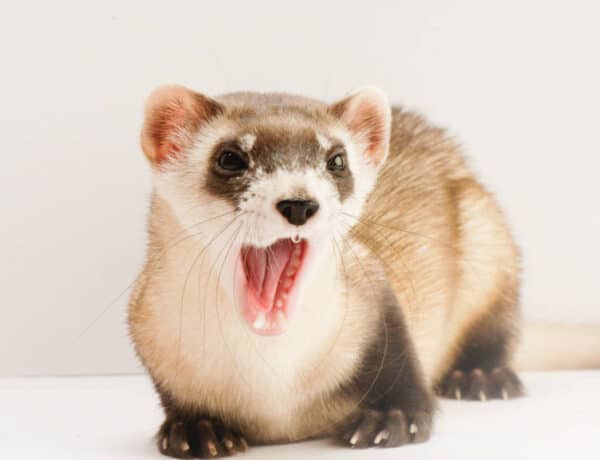Introduction
Why Do Ferrets Shake: Ferrets, those curious and playful domesticated mustelids, often exhibit peculiar behaviors that can both intrigue and confound their owners. One such behavior that leaves many ferret enthusiasts puzzled is the act of shaking or shivering. While it might appear alarming or even worrisome at first glance, the reasons behind why ferrets cage shake are multifaceted and often benign. In this exploration, we delve into the various factors that lead ferrets to shake, shedding light on their fascinating world of communication, physiology, and instinctual behaviors. Understanding why ferrets shake can help us provide them with the care and attention they need to lead happy and healthy lives as cherished members of our households. Intriguingly, a ferret’s tendency to shake can be attributed to a combination of factors, some of which are perfectly natural and others that may require a closer look.
Shaking can be one of these non-verbal forms of communication, serving as a signal to other ferrets or even their human companions. Physiologically, ferrets have a fast metabolism and are susceptible to temperature fluctuations. In colder environments or when they feel chilly, ferrets may shake as a way to generate body heat. Conversely, if they are experiencing discomfort, fear, or anxiety, shaking may also manifest as a coping mechanism. Understanding the environmental conditions and emotional states that trigger these shivering episodes is crucial to providing a comfortable and stress-free environment for your ferret. Additionally, ferrets possess a strong hunting instinct, and their shaking behavior can be reminiscent of their wild ancestors’ response to prey.
This instinctual behavior may emerge during playtime or when they are presented with new toys or objects. It’s essential to recognize the difference between playful shaking and shaking due to stress or discomfort. In this exploration of why ferrets shake, we will delve deeper into these facets, demystifying the various scenarios in which this behavior arises and offering insights into how to interpret and respond to it. By gaining a better understanding of why ferrets shake, we can ensure that they live content, healthy, and enriched lives in our care. Ferrets, as highly social animals, use body language and vocalizations to convey their emotions and intentions.

How do you know if a ferret is scared?
Fear. Ferrets definitely react strongly to fear. They can hiss, screech, or release a very unpleasant stench. If your ferret is exhibiting any of these signs, remove him from the vicinity of whatever it was that caused this reaction, and put him back in his cage.
One of the most obvious signs of fear in ferrets is their desire to escape from the perceived threat. They may try to hide, run away, or seek refuge in their cage or a dark, secluded space.
Similar to the behavior explored in the previous question about why ferrets shake, trembling or shivering can be a sign of fear. If a ferret is cold or frightened, it may exhibit this behavior.
Some ferrets may salivate excessively when they are scared or stressed. This can manifest as drooling, and it’s a sign that the ferret is experiencing significant distress.
Ferrets may seek refuge in hiding spots within their environment, such as burrowing under blankets, cushions, or inside their cage. This behavior is a way for them to feel more secure when they are frightened.
How do you know if your ferret doesn’t like you?
Your ferret is in a “fight or flight” mode. Your ferret may also hiss while doing this to vocalize that it is upset. Hissing also can be just an indication that your ferret doesn’t like something; this means that hissing by itself is not necessarily an indicator of fear.
If your ferret consistently avoids interaction with you, such as hiding, running away, or retreating to their cage when you approach, it may indicate that they are not yet comfortable with your presence.
While it’s not uncommon for ferrets to playfully nip during play, if your ferret hisses, bites, or displays aggressive behavior when you try to handle them, it could be a sign of discomfort or fear.
Watch for signs of tension in your ferret’s body language, such as a stiff posture, flattened ears, or a raised back. These are indicators that they might not be feeling relaxed around you.
Ferrets can make various sounds to communicate, but if your ferret makes distressed or unusual noises when you interact with them, it could suggest they are not comfortable or happy.
Why did my ferret bite me?
A ferret may bite because of pain, but they may also bite to get attention. When you are busy and the ferret wants to play, it is common for them to nip your foot or ankle to say “Hey! I’m down here and I want something.” Realistically, that’s the one part of you these short little animals can reach.
Playfulness: Ferrets are naturally playful and may bite during playtime. This is often accompanied by playful behavior such as pouncing, chasing, and nipping. While this type of biting is usually gentle and not intended to harm, it can still be startling if not expected.
Teething: Young ferrets, like puppies and kittens, go through a teething phase. During this time, they may bite to alleviate discomfort or to explore their environment. Providing appropriate chew toys can help redirect their biting behavior.
Fear or Agitation: Ferrets may bite if they feel threatened, scared, or cornered. This can occur if you handle them too roughly or invade their personal space when they’re not comfortable. It’s essential to approach your ferret calmly and gently to avoid triggering fear-based aggression.
Pain or Discomfort: If a ferret is in pain due to an injury or an underlying health issue, it may bite as a response to being touched or picked up. Always check for signs of illness or injury if your ferret’s behavior suddenly changes.
Are ferrets easily hurt?
They are very fragile animals and can be easily injured if handled inappropriately or dropped. Like a cat, they love to nap and usually sleep up to 20 hours a day. When they are awake, however, they are very active and playful pets!
Teething: Like puppies and kittens, young ferrets go through a teething phase, which can make them prone to chewing on objects, including electrical cords, which can lead to injuries from electrical shock or ingestion of foreign objects.
Vulnerability to Cold: Ferrets are sensitive to temperature extremes, particularly to cold temperatures. They are more susceptible to hypothermia and should be kept in a warm environment, especially during the winter months.
Respiratory Sensitivity: Ferrets are prone to respiratory issues, including infections. They have a high metabolic rate and can become stressed easily, which may weaken their immune system and make them more susceptible to respiratory infections.
Gastrointestinal Sensitivity: Ferrets have a sensitive digestive system and can be prone to gastrointestinal issues if they ingest foreign objects or inappropriate foods. Blockages in their intestines can be life-threatening.
How do you get a ferret to trust you?
The best way to build trust with your ferret is to spend quality time with them every day. Ferrets should be getting time outside of their cages every day to play and explore. Set up a space where they can do this with you. Hang out together in this shared space while you read a book or play with toys with them.
Respect Their Space: When you first bring a ferret into your home, give them time to acclimate to their new environment. Set up a comfortable and secure space for them, such as a cage or enclosure, and let them explore it at their own pace.
Move Slowly and Calmly: Ferrets can be easily startled, so move slowly and calmly when you’re around them. Avoid sudden movements or loud noises that may frighten them.
Hand Feeding: Offer your ferret treats or their favorite food by hand. This not only associates your presence with positive experiences but also helps them become accustomed to your scent and touch.
Play and Interaction: Spend time playing with your ferret using toys and interactive games. Ferrets are naturally playful, and playtime is an excellent opportunity to bond with them. Use toys like feather wands, tunnels, and balls to engage them.
Are ferrets calm pets?
Peace and Quiet
Ferrets make good pets if you want to maintain peace and quiet in your household. Although known for their high energy, ferrets are very quiet too and sleep for about 18 hours per day! They are not nocturnal, but sleep the majority of the day just like cats do.
Playfulness and Energy: Ferrets are naturally playful and have boundless energy, especially when they are young. They love to explore, romp, and engage in activities that mimic their hunting instincts. Their playfulness can be a lot of fun, but it can also make them seem hyperactive and restless to some people.
Rest Periods: While ferrets are active and playful for a good part of the day, they also need plenty of rest. Ferrets typically sleep between 14 and 18 hours a day, and they do have moments of calmness during their sleep cycles. These periods can be a good opportunity for quiet interaction and bonding.
Training and Socialization: Ferrets can be trained to some extent, and they can become accustomed to routines and social interactions. With consistent training and socialization efforts, you can encourage calmer behavior when needed.
Age and Health: As ferrets age, they may become somewhat calmer compared to their hyperactive youth. Additionally, a healthy and well-exercised ferret is more likely to display balanced and calm behavior.
Do ferrets enjoy being held?
Ferrets really enjoy spending time with their human companions are usually happy to be picked up and cuddled. If they’re frightened or accidentally hurt, ferrets can give a strong bite. Getting them used to being picked up when they’re young is really important.
Ferrets that have been well-socialized from a young age are generally more likely to enjoy being held. Proper socialization involves exposing them to different people, environments, and experiences in a positive and reassuring manner.
Young ferrets, especially kits (baby ferrets), tend to be more energetic and may not be as inclined to sit still for long periods of cuddling. As they mature, some ferrets may become more tolerant of being held.
Just like people, ferrets have diverse personalities. Some may have a more outgoing and sociable nature, making them more receptive to being held, while others may be more reserved or independent.
A ferret’s past experiences with being held can influence their comfort level. If they’ve had positive interactions and gentle handling, they are more likely to enjoy it. Conversely, if they’ve had negative or rough handling, they may become more wary of being held.
Why do ferrets hiss at you?
Hissing could mean your ferret is angry or frightened and you should leave him along to calm down, or if playing with other ferrets, hissing can be a means of communication. Your ferret’s body language will usually give your ferret’s mood away!
Fear or Anxiety: One of the most common reasons for a ferret to hiss is fear or anxiety. If a ferret feels threatened or cornered, it may hiss as a warning to back off. This is a defensive response intended to deter any potential threat.
Pain or Discomfort: When ferrets are in pain or experiencing discomfort due to an injury or illness, they may hiss as a way of expressing their distress. It’s crucial to examine your ferret and consult with a veterinarian if you suspect they may be in pain.
Overstimulation: Ferrets are highly energetic animals, but they also have their limits when it comes to play and interaction. If a ferret becomes overstimulated during play or handling, it may hiss to signal that it needs a break.
Territorial Behavior: Some ferrets are naturally more territorial than others, and they may hiss if they feel their territory is being invaded. This can occur around their food, toys, or sleeping area.

Conclusion
In the realm of ferret behavior, the mystery behind why they shake is both intriguing and enlightening. As we’ve uncovered, ferrets shake for a multitude of reasons, each offering a glimpse into their social, physiological, and instinctual worlds. From non-verbal communication with fellow ferrets to managing temperature fluctuations and coping with stress or anxiety, ferret shaking is a versatile tool in their behavioral repertoire. Understanding the context and triggers for ferret shaking is essential for responsible ferret ownership. By recognizing the nuances of their body language, we can respond appropriately to their needs, ensuring their comfort and happiness. Whether it’s providing a cozy environment, engaging them in playful activities, or offering reassurance during moments of stress, our awareness empowers us to be better caregivers to these beloved pets.
By appreciating the complexity of their behaviors, we can nurture their well-being, strengthening the bond between ferrets and their human companions, and enriching the lives of both. Furthermore, the exploration of why ferrets shake underscores the importance of responsible pet ownership. Ferrets, with their unique needs and behaviors, thrive when provided with a caring and attentive environment. As we’ve learned, shaking can be a subtle indicator of their emotional state and physical comfort. This insight can guide us in making informed decisions about their diet, housing, and social interactions.
In the grand tapestry of animal behavior, the quirks and idiosyncrasies of ferrets, including their tendency to shake, remind us of the rich diversity within the animal kingdom. Each species has its unique language and ways of expressing themselves, and by deciphering these cues, we embark on a fascinating journey of discovery. Ultimately, the question of why ferrets shake serves as a testament to the endless wonder of the animal world and our ongoing commitment to learning about and caring for the creatures with whom we share our lives. It reinforces the idea that our role as stewards of these delightful animals involves not just providing for their physical needs but also understanding their behaviors and emotions, allowing us to foster a harmonious and fulfilling relationship between ferrets and their human companions.





No Comments